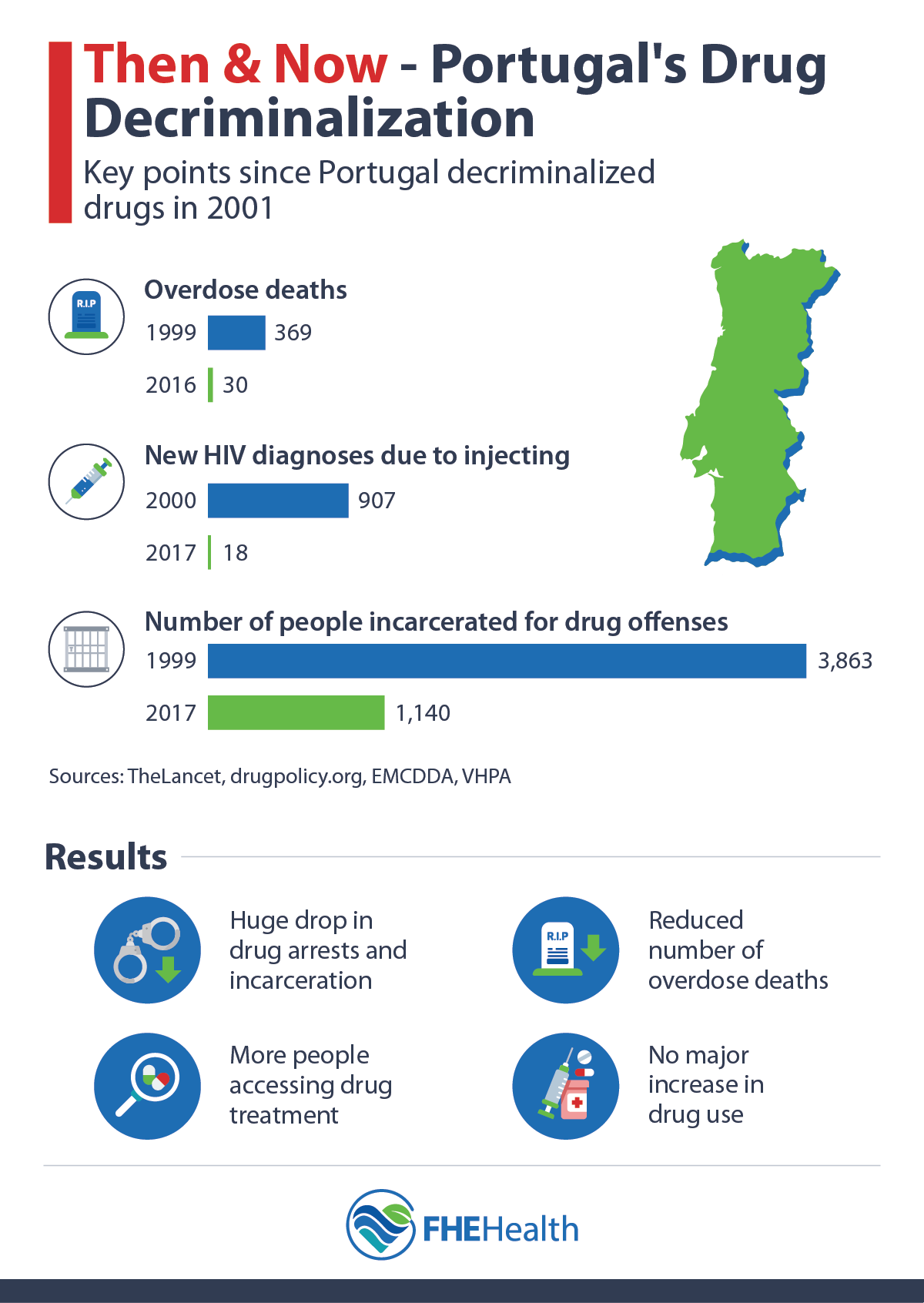
Drug overdoses and drug overdose deaths are a significant and growing public health problem in this country. In the year 2020, a record 90,000 people died from drug overdose in the United States, and in 2021 that number increased even more—to nearly 110,000 deaths.
Experts have highlighted many factors that could be contributing to these deaths, including:
- More widespread substance use
- Feelings of social isolation
- Increasingly dangerous drugs such as heroin and fentanyl
- Social, economic, and mental health crises
- Aggressive anti-drug policies that cause drug users to seek out more dangerous suppliers
- Fears of prosecution that discourage people from seeking medical care
Such issues serve to illustrate just how complex and multi-faceted the problem is. However, some countries seem to be having more success in addressing it, as evidenced by their significantly lower overdose rates. As the country with the lowest overdose rates, for example, Portugal has become a model with respect to public health policies that appear to be working to reduce and prevent overdose—but why?

Portugal: The Country with the Lowest Drug Overdose Rates
Several decades ago, Portugal was struggling with an opioid epidemic that was remarkably similar to the one the U.S. faces today. The problem was so immense that Lisbon became known as the “heroin capital” of Europe. Since the turn of the century, though, addiction and overdose rates have dramatically fallen. The question is why?
One possible explanation might be the government’s passage of laws that decriminalized the use and possession of small amounts of drugs for individual use. If the police caught someone with drugs, that individual would no longer face prison time. Instead, a panel of healthcare professionals knowledgeable about substance use disorders would analyze the situation and decide the outcome (a fine, community service, or entrance into a drug treatment program).
Why Portugal Has Low Drug Overdose Rates
Many factors contributed to making Portugal the country with the lowest overdose rates. While much of the focus is on the act of decriminalization itself, that was part of a broader effort that aimed for a specific goal: more people seeking treatment; and it seems to be working. In the years since decriminalization, more than three-quarters of people with opioid use disorders in Portugal have sought treatment.
Because people no longer had to fear the justice system for using small amounts of drugs, they were more willing to seek medical care when overdoses occurred. As a result, overdose deaths dropped dramatically. This effect also stems from an increased focus on harm reduction, one of the earliest examples of which was a needle exchange program that allowed people to replace dirty needles with clean ones. Not only did it lower overdoses from the mixing of dangerous substances, but it also dropped rates of hepatitis C and HIV.
Portugal has also been exploring other harm reduction options and testing them in high-use areas. In Lisbon, for example, a drug-checking service allows people to submit drugs for examination. Technicians identify the contents of the drug. That in turn protects people from harmful and often deadly additives like fentanyl.
Substance use rooms are another harm reduction experiment in Portugal. Though only one is currently in operation—along with a mobile unit—the room provides people with a safe, clean place to administer drugs. This removes the potential for environmental contaminants that could lead to a more dangerous overdose.
Finally, the Portugal model includes three major programs that encourage aftercare and the social reintegration of people who go through the drug dissuasion programs. By providing citizens with training opportunities, housing, and employment support, Portugal is addressing key factors that often contribute to substance use disorders.
Comparison to Other Countries
Comparing Portugal’s overdose statistics and policies with those in other countries provides a fuller picture. In comparison to the rest of Europe, Portugal has a much lower incidence of drug deaths with a rate of 10 drug deaths per million population (pmp) in 2020. Norway has begun to follow Portugal’s lead in recent years, but Norway’s old policies of criminalizing drug use led to the country having the highest rate of drug deaths in all of Europe: 85 deaths per million population in 2020. (In the same year, the United States estimated nearly 300 deaths pmp.)
Additionally, while nearly 75 percent of people in Portugal with a substance use disorder receive the appropriate medical care, less than half of Americans who need the same treatment receive it.
While many countries cite the potential cost of such programs as a reason for avoiding them, Portugal has actually saved money by swapping to their current decriminalization model. In a U.S. cost-effectiveness analysis of syringe exchange programs like the one in Portugal, researchers found that each dollar spent would save at least six dollars in avoided costs associated with HIV alone.
Implications and Lessons Learned – What It Means
Portugal’s approach to the drug overdose epidemic can be instructive. As experts have noted, people are more likely to seek treatment for substance use disorders when there is less societal stigma and reasons to feel ashamed. Policies that decriminalize minor drug offenses may help in this respect, by reinforcing the message that addiction, as a medical condition, responds better to treatment than to prison sentences.
Another lesson worth noting is that decriminalization alone is not enough to solve the overdose epidemic. Harm reduction policies like substance use rooms and drug-checking services remain highly controversial. The lesson in this case is not so much that these exact same measures are undoubtedly the answer to high drug overdose rates in other countries like the U.S. but rather that an effective solution will address the problem from many angles via many interventions.
Lastly, Portugal’s success in lowering its overdose rates is encouraging. It suggests that with stronger resolve and a willingness to be innovative and experiment, we in the U.S. can also save more lives and spare more families from the tragedy of overdose and addiction.






